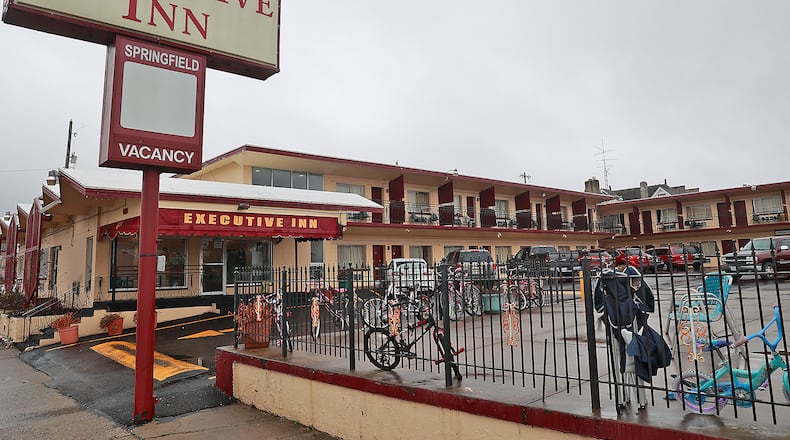Commissioners on Tuesday heard first reading of an ordinance that would authorize the purchase of the Executive Inn as another solution — but only temporarily.
The commission is likely to act at the next meeting to approve the purchase of The Executive Inn, located close to the city center at 325 W. Columbia St., and three additional residential properties adjacent to it. Funding the purchase of the motel and adjacent properties will come from the federal American Rescue Plan at a cost totaling $2.2 million.
Springfield City Manager Bryan Heck explained both the Executive and Villager inns have been used for the past three years as supplemental housing options for displaced individuals and families because congregate, or group, housing was eliminated because of the spread of COVID-19.
“A lot of the federal money during the COVID pandemic was made available to municipalities with a named objective to address the problems of the homeless and displaced individuals. But we knew the use of hotel placement was not a long-term sustainable option,” he said.
The city, county and Homelessness Task Force worked together to address the issue, seeking what Heck called “strategic and sustainable solutions.”
Congregate housing is not family friendly, Heck said.
“One of the outcomes of the COVID experience is an increase in more families and more children than we’ve previously experienced among those seeking shelter,” he said. “It’s taken time to develop the capacity and infrastructure for what we have today among the homeless population.”
Heck expressed gratitude for the federal money the city will apply to the purchase.
“But for the American Rescue Plan, we would not have the opportunity to address the issue,” he said.
Heck explained that in the short term, the Executive Inn and adjacent residential properties will all be used to continue to address the needs of the homeless while work is done at the Villager Inn to make it more family friendly.
Once that process is complete, the use of the Executive Inn and residential homes as homeless shelters will be phased out, and the buildings will be demolished and made available for sale. City officials see potential in the properties for reinvestment opportunities, and the creation of an additional redevelopment block opportunity in the downtown area.
Commissioners also authorized additional spending to reimburse Sheltered Inc., the local non-profit leading the effort to serve the homeless in the city, for expenses incurred from Dec. 1 to date in delivery of services. The amount specified an increase in funding not to exceed $200,000 with a total of expense reimbursement for the charity not to exceed $500,000. The additional expenses were in large part the result of the disbanding of an encampment of the homeless in the city that became unsustainable as temperatures dropped below freezing with the onset of winter weather.
Expanding the availability of affordable housing was also addressed as the commissioners moved forward with the purchase of a number of properties with plans for the Clark County Land Bank to rehab and improve infrastructure to help the neighborhood thrive.
Another initiative approved provides federal funding for the Health and Safety Repair Program so that existing housing stock can be updated and improved to enable residents to stay in homes that need repair or upgrade to remain habitable. Springfield’s Habitat for Humanity program received a $75,000 grant to assist with those efforts.
City officials also approved expenditures of $5.7 million for major upgrades to the city’s technological infrastructure. Assistant Mayor Rob Rue praised the project, noting that the new system will enable the city “to be even more transparent about how we spend the money of taxpayers.” The system has not had a major overhaul since installation in 1995.
About the Author
